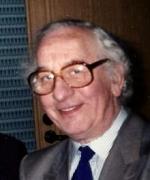Peter Paul Ewald (1888 - 1985):
Scientist
Paul Ewald was born in Berlin and studied at Cambridge, Gottingen and Munich. He was an X-ray technician in the German army during the First World War. He taught in Munich and in 1921 was appointed Professor of Theoretical Physics at the University of Stuttgart. In 1937 he and his family fled from Nazi Germany, and after two years at Cambridge University he became first lecturer and then professor at Queen's University, Belfast, with a period spent as Professor of Physics in America. He was a key figure in the modern science of X-ray crystallography for over sixty years, which has facilitated the understanding of organic molecules such as proteins and DNA. In 1923 he published Kristalle und Roentgenstrallen, and in 1962 Fifty Years of X-Ray Diffraction. He founded, with others, the Strukkurbericht, a repository for results on crystal structure, edited Zeitschrift fur Kristallographie and founded and edited the international journal Acta Crystallographica. He was Secretary-General and then Vice-President of the International Union of Physics, which he had revived. In 1979 he was awarded the first Gregori Aminoff Medal of the Royal Swedish Academy. The International Union of Crystallography, of which he was a co-founder and President, established the Ewald Prize in his honour. He was a Fellow of the Royal Society and a member of the American Academy of Arts and Sciences. He had five honorary degrees, including those from Stuttgart and the Sorbonne, and in 1978 was awarded the Max Planck Medal, the highest honour of the German Physical Society.
|












